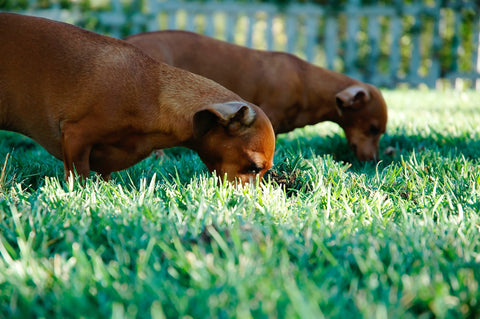We've all been there. You and your pup are walking at a nice clip, sun shining, wind blowing gently on your face - and suddenly your dog lunges away from you toward a nice big mound of crab-grass.
Many canine owners are unsure what to do in this situation - Pry their lovable Lassie away from his prairie prowl or let him chomp to his heart's desire?
This uncertainty boils down to concern. Is it dangerous for your fur-friend to eat grass at his leisure or is it more-or-less natural.
Why Do Dogs Eat Grass?

Nutrition
You may believe that your fluffer's teeth are made only for ripping kibbles, hunks of meat, or his stuffed Simba apart, but dog's are actually omnivorous. Classifying canines as omnivores is still seen as somewhat controversial - mostly due to canines being under the order Carnivora.
Since the dawn of dog, canines have been doing everything in their power to survive, and it wasn't always easy. With meat not always in great supply, it only made sense for the lumbering ancestor of the St. Bernard to gravitate to something a bit more.. attainable.
Much is now known about the behavioral, nutritional and physical factors of dogs and why they are true omnivores.
- A dog's molars are flat, an ideal surface for chewing plant matter
- A dog's GI tract is much longer than that of a cat ( 3.9 meters vs. 1.7 meters), occupying 23% of the GI space (consistent with other omnivores)
- Dogs are able to process betacarotene and convert it into Vitamin A - a key nutrient
Questions Dog Owners Have About Non-Meat Foods
Are mushrooms safe for your dogs?
Having the understanding that dogs are omnivorous makes it much easier to understand why they may be gorging on a grass salad.
One reason dogs eat grass to supplement their diet with often valuable nutrition
Many different wild grasses are rich in folate, or folic acid. This compound is invaluable for the creation of hemoglobin. Hemoglobin is an important protein that aids the movement of oxygen within the bloodstream. If your dog does not have enough of this nutrient, he may seek it out among the blades of grass.
Digestion

Another reason dogs may be chewing on that cobble-stone kale is for digestive purposes.
Having high-quality fiber in your diet is invaluable for getting the bad stuff outta your body - just ask grandma. Often times when a dog has an upset stomach, he will look to grass to clear things out.
Any pet parent concerned with animal wellness knows that it is always smart to monitor the quality and color of your dog's poops. If a bowel movement is mostly grass, it is an indication that he is using the grass to pass other things he may have picked up.
With that said, too much of a good thing can be not so good for his belly. If your canine is teething and cannot help but surf the turf, give him a bison horn to quell those toothy woes. Too much grass can block up his intestines, leading to a potentially dangerous situation.
While grass is a natural source of nutrients for dogs and a good digestion tool, there are better options.
Human-Grade Probiotic Powder for Dogs
Giving your dog human-grade probiotic powder is one of the best things you can do for his gut. Put simply, probiotics are good bacteria naturally found within the gut. Often times their GI tract can become out of whack-whether through the use of antibiotics, eating something covered in bad bacteria, or getting sick.
When you give your dog a probiotic, different strains of good bacteria work to recolonize the gut and help your dog get the most out of the food you are giving him.
Probiotics help maintain proper gut health, support a healthy immune system, and maintain the coat and skin he's always wanted! When your dog's gut is out of whack, strange things can occur - from faint-inducing farts to certain allergies.
Grass and pollen allergies are ironically one of the more common allergies dogs deal with. Reactions to weeds are generally mostly harmless, but that doesn't mean your dog's skin isn't feeling the effects. Grass-borne allergic reactions are itchy and often cause your canine needless suffering. When pooches have a penchant for ingesting the same grass they're allergic to, it can create a vicious cycle of liquid poops and a grumpy growler.
The fact that probiotics support a healthy immune system and, as consequence, a healthy allergenic response, getting your dog on the highest quality probiotics available can make him a little less concerned with the freshly dewed blades and keep his skin feeling smooth!
If your dog is set on including additional veggies in his diet, give him a tasty treat! Carrots and sweet potatoes are among the most nutritious vegetables dogs can have. With the ability to convert betacarotene to vitamin A, it's a no brainer!
-
1/2 cup diced sweet potatoes
-
1/2 cup diced carrots
-
1/2 teaspoon crushed ginger
-
2 sachet Salmon Sushi flavored Relaxin' Rover
Bring 4 cups of water to a boil and add the sweet potatoes, carrots and ginger. Cook for 10-15 minutes, or until soft. Add sweet potatoes, carrots, and ginger into mixing bowl. Whisk until puree.
Refrigerate until cool. Add Salmon Sushi flavored Relaxin Rover and mix until distributed evenly.
Spoon Salmon Sushi puree into an ice-tray and freeze.
Give your dog this insanely nutritious treat after a a successful potty break, a hot day, or just because he's your lovely companion.
Why Do Cats Eat Grass?
Similar to their barking arch-nemesis, cats CAN eat grass. But not for the reasons you might expect. Check out The Purrington Post for more!
